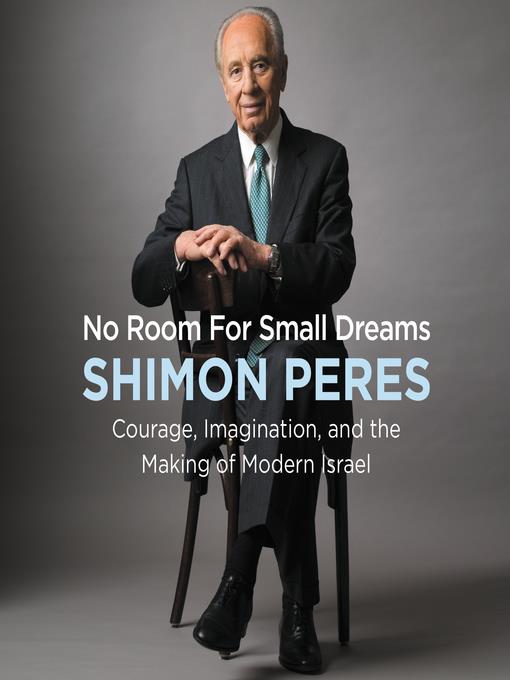
No Room for Small Dreams
Courage, Imagination, and the Making of Modern Israel
کتاب های مرتبط
- اطلاعات
- نقد و بررسی
- دیدگاه کاربران
نقد و بررسی

Mark Bramhall doesn't try to sound like Shimon Peres in this series of autobiographical sketches by the former prime minister and, later, president of Israel. But he so inhabits the role as narrator that one might be tempted to think the work is being narrated by the author. He doesn't use an accent, which would be distracting, but his facility with the occasional Hebrew and Yiddish sounds authentic. Peres wrote this book shortly before his death, and in it he covers a variety of momentous periods in Israel's history and his role in each--such as the 1948 war for independence, the raid at the Entebbe airport to free hostages, and the decision to seek peace with Palestinians in the West Bank and Gaza. It's a fascinating look at nation's history, and Bramhall's reading makes it an enjoyable listen. R.C.G. � AudioFile 2017, Portland, Maine

September 4, 2017
In the final book from Peres (Ben Gurion: A Political Life), completed only weeks before his death in 2016 at the age of 93, the Israeli founding father and Nobel Peace Prize winner takes a moving look at the remarkable arc of his life. Despite the humble circumstances of his upbringing in Poland, Peres came to play a prominent role in the Zionist movement, the establishment of the state of Israel, its development of a robust self-defense capacity, and the struggle for peace with its Arab neighbors. Even readers familiar with the general contours of Peres’s life story will find surprises, as in the pivotal influence he had, at just 23, on Zionist leader David Ben-Gurion’s strategizing. He offers many other behind-the-scenes looks at key historical events, including the 1956 Arab-Israeli War, the creation of the Israeli aviation industry, and the daring hostage rescue at Entebbe, for which he was the most forceful advocate. Peres remained a clear-eyed optimist until the end, notwithstanding the assassination of his political adversary turned ally, Yitzhak Rabin, and the lack of progress in achieving peace with the Palestinians. Comforting those who view the current situation as bereft of hope, Peres offers his own achievements as evidence that the seemingly impossible can become reality.

April 15, 2017
Former Israeli president and prime minister Peres, a recipient of the Nobel Peace Prize with Yasser Arafat and Yitzhak Rabin, completed this work weeks before his fatal stroke. A look back at Israeli history and forward to what it will take to establish peace in the Middle East; with a 100,000-copy first printing.
Copyright 2017 Library Journal, LLC Used with permission.

September 1, 2017
Former Israeli president and prime minister Peres (1923-2016) wrote this brief autobiography in his 90s to highlight what he considered to be his major accomplishments in a public service career that spanned decades. The Nobel Peace Prize laureate further describes his firm support for a peaceful, two-state solution regarding the ongoing Israeli- Palestinian conflict. The politician recounts his emigration at age 11 from a shtetl in Poland, near the country's then border with Russia, to mandate-era Palestine and his efforts in the kibbutz movement, which attracted the notice of Israeli prime minister David Ben-Gurion. Peres also focuses on his role in securing arms and allies for the nascent state of Israel, arranging the development of the Negev Nuclear Research Center, planning and advocating for Operation Entebbe in 1976, and helping to build Israel's tech and financial industries. He credits his success to mentor Ben-Gurion and colleagues Moshe Dayan and Yitschak Rabin. VERDICT For those interested in learning more about Peres's dream of a prosperous future for Israel and her neighbors.--Joel Neuberg, Santa Rosa Junior Coll. Lib., CA
Copyright 2017 Library Journal, LLC Used with permission.

August 1, 2017
In a posthumous publication, the eminent former Israeli leader delivers a heartfelt appeal to the best in the Israeli Jewish character.Although he was an early proponent of a vigorous Israeli defense system, aviation industry, and Dimona nuclear reactor, Peres (Ben-Gurion, 2011, etc.), who died in 2016, was known in his later career as a peace seeker. In this nonpolemical book, he candidly addresses this contradiction ("it was not me that changed; it was the situation that changed"). Born in 1923 in Poland, where, as a boy, the dream of Zionism caught his imagination, Peres was particularly inspired by the wisdom of his revered grandfather, who told the 11-year-old when he emigrated, "Promise me you'll always remain Jewish." A member of Ben Shemen Youth Village, farming on the frontier and also having to defend it from attack, Peres was caught up in the youth movement's debates of how the country should operate politically, and he became a young leader, catching the eye of the legendary David Ben-Gurion. The author actively campaigned for statehood, and that meant having to prepare for a war against the Arabs. "What good is the birth of a new state," Ben-Gurion's logic ran, "if it's immediately strangled in its crib?" Peres was appointed to transform the Haganah (later to become the Israel Defense Forces), and he comically depicts how he purchased arms directly from Czechoslovakia, then France, before the U.S. became a military supplier. Regarding the building of Dimona, the author cites Israeli policy of "nuclear ambiguity" as the effective deterrent in their enemies' "belief that they could overpower us." While Peres offers a self-glorying depiction of his role in the disastrous 1956 Suez Crisis, his desire to make peace with the Palestinians was sincere (he won the Nobel Peace Prize along with Yitzak Rabin and Yasser Arafat), and his drive to render the country a land of high-tech startups was truly visionary. Ultimately, Peres champions Israel as an immigrant nation strengthened by its "culture of chutzpah." A brief but poignant work of memoir and history.
COPYRIGHT(2017) Kirkus Reviews, ALL RIGHTS RESERVED.

























دیدگاه کاربران